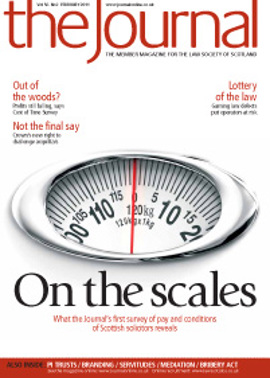Tough choices

After a chance to rest and recharge over the Christmas and New Year period, the return to work in 2011 proved as busy as ever. The year began with critical discussions about proposed cuts to the Scottish legal aid budget. Representatives from local faculties and bar associations from across Scotland met the Society’s Criminal Legal Aid Negotiating Team to consider how the profession should respond to the Scottish Government’s intention to reduce the criminal legal aid budget for 2010-11, while maintaining core areas of work and protecting access to justice.
A consensus emerged – the Scottish Government’s proposed significant expansion of the Public Defence Solicitors Office to carry out criminal legal aid work was considered entirely unacceptable. While the legal aid budget cannot be exempt from scrutiny, opening four or five new PDSO offices with 41 new solicitors – therefore taking a 60-75% share of the court duty scheme – was clearly not viable at a time when jobs are being cut in so many other parts of the public sector.
Essentially, the proposal was not the best way to deliver the required savings. With that in mind, an alternative package of savings was identified and supported at the faculty meeting: better use of the current PDSO offices rather than a large expansion across Scotland; a £30 reduction in the summary core fee; and, a reduction to the fee arrangements for matters before stipendiary magistrates. Taken together, this package could save £4.5 million and avoid the need to massively expand the PDSO. However, there was also a view that, if the legal aid budget allowed, money should be given back via a higher stipendiary court fee.
Towards the end of the month, Justice Secretary Kenny MacAskill broadly accepted these suggestions, which shows the importance and benefit of engaging constructively with ministers on these kinds of issues. However, the changes will undoubtedly prove difficult for the profession, particularly in Glasgow where the cut to the stipendiary court fee will be felt. The Society’s commitment throughout this process, which involved tight timescales, has been to ensure that these cuts, which ministers made clear were non-negotiable, were taken forward in a way that caused least damage to the profession throughout Scotland and their clients.
The dialogue continues on some of the detail as we move towards the introduction of regulations in the Scottish Parliament. We should bear in mind that this has only been the first round in the cuts to the justice budget, with summary criminal causes targeted because immediate savings could be made. Looking ahead, there will be pressures on solemn criminal work and on civil legal aid. There is a danger of access to justice being denied or prejudiced unless we are vigilant and can find ways to permit the reductions in public spending with the least prejudice to the interests of our members and the public who need the access to justice provided by our members.
Rules for the regulator
The Society also moves closer to our Annual General Meeting, which will be held earlier than usual, in March rather than May. Other than the important business of adopting the accounts, members will also have an opportunity to approve a new constitution and to review new standing orders, which it is proposed will be adopted by the Council.
The process of redrafting these key documents has been ongoing for around two years, involving extensive consultation and an unprecedented response from members, which provided valuable input into the change process.
The final versions, as approved by the Council last month, will bring our constitutional arrangements into the 21st century while allowing flexibility for further change in the future: for instance, permitting deficiencies in regional or sectoral representation to be corrected. Significantly, the changes will also establish a Regulatory Committee, which will place us in a position to regulate alternative business structures, as supported by our members.
Rescinding the existing constitution requires a two-thirds majority. As ever, your votes will count so I urge you to visit the Society’s website, where you will find the new constitution and standing orders along with background information. I believe the new documents provide clarity about members’ rights and enshrine the primacy of our democratically elected Council in our rulebook. The Society is here to serve its members. This is best done when the membership engages with the Society to express its views. So, I hope for a large turnout at the AGM, if not in person then at least by proxy.
In this issue
- Mutuality in action
- Tough choices
- Show us the files
- RoS launch business eZine
- Rewards of the job
- Pressure points
- Measure for measure
- Rage against the machine?
- Second bite at the cherry
- Personal injury trusts: benefits and PITfalls
- Countdown for Legal Aid Online
- Training: SYLA will play its part
- Law reform update
- Branding or bragging?
- The learning curve
- Ask Ash
- Mediating retirement
- CICA - a question of timing
- The evidence against
- Fought all the way
- Family friendly
- Stakes too high
- Much ado about plenty
- Limits of authority
- Scottish Solicitors' Discipline Tribunal
- Website review
- Book reviews
- Straight dealing
- Servitudes, developers and flexible rights








